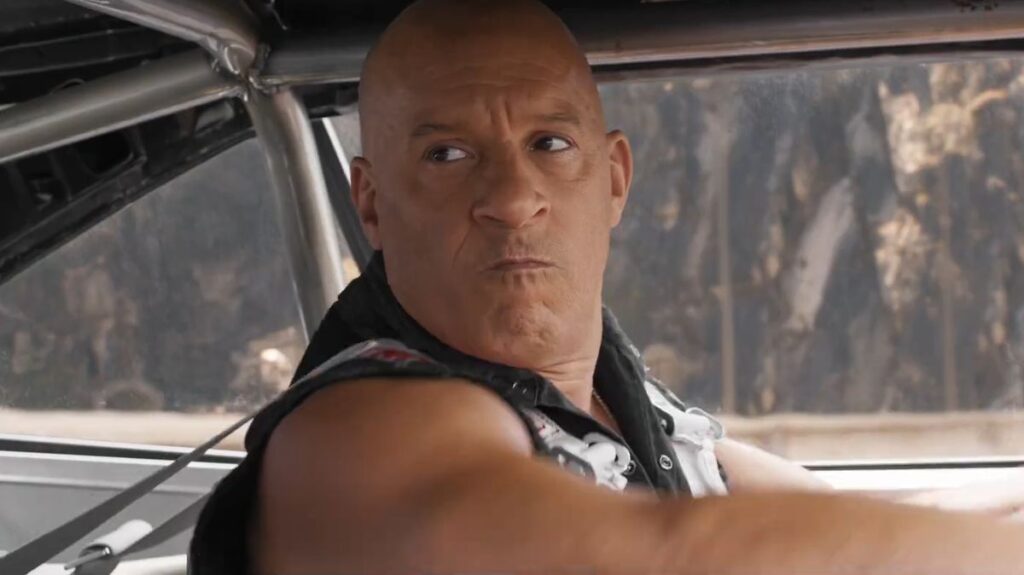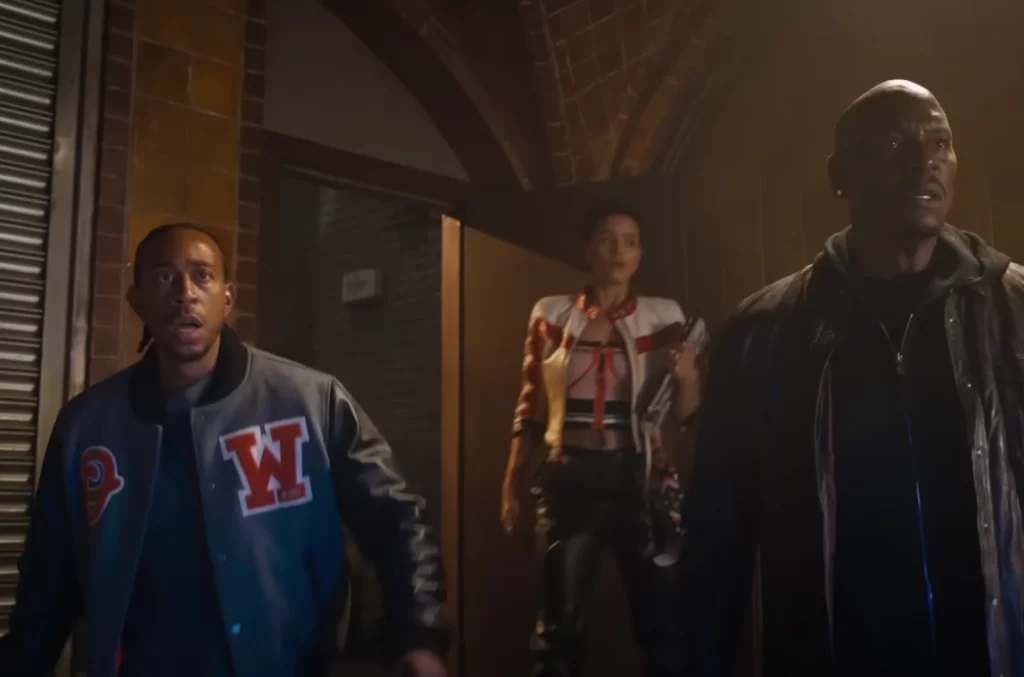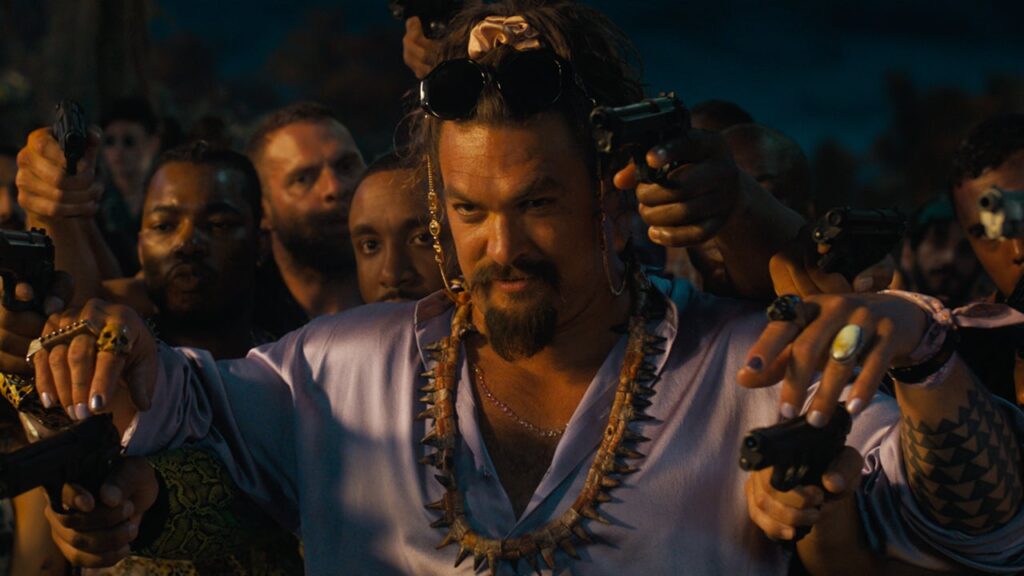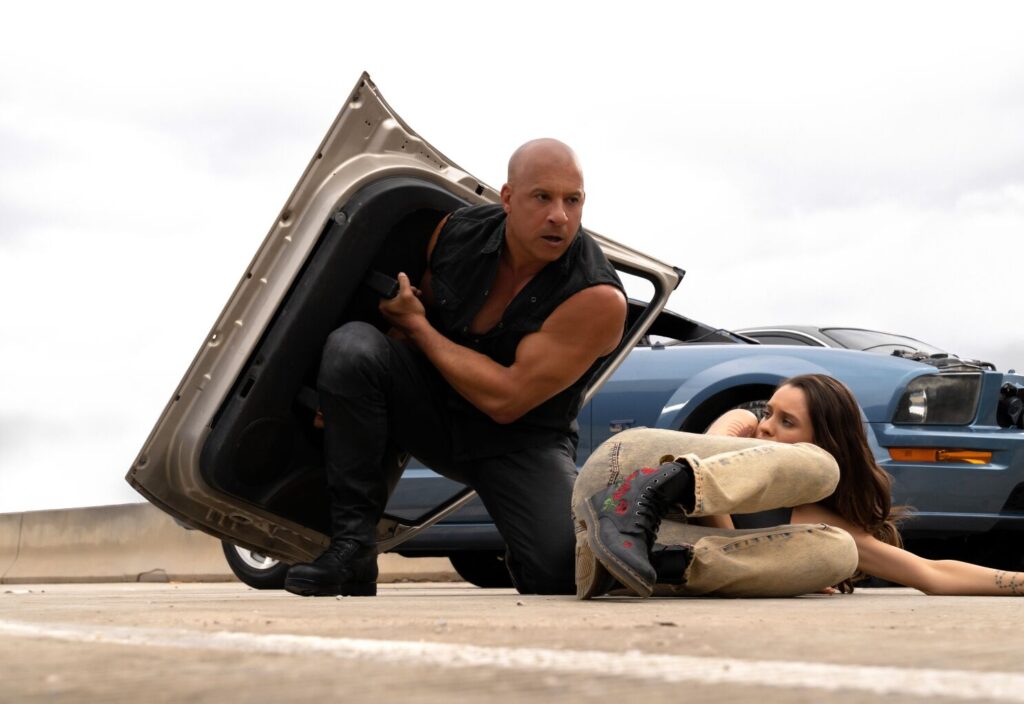
Bloat is endemic to all franchises, but the Fast & Furious pictures have a peculiar way of taking on water. For all of their chases and explosions and putative danger, these noisy conflagrations are curiously averse to death, loss, and even long-term conflict; antagonists aren’t defeated but converted into partners—new members of an ever-sprawling family. Fast X, the tidily titled tenth installment, doesn’t attempt to solve this problem, but it does exhibit some meta awareness of it. At one point, a beefy suit named Aimes (Alan Ritchson, from Amazon’s Reacher series), who works for a nebulous government(?) outfit known as The Agency, delivers an expository rundown describing how an erstwhile gang of California street racers gradually shifted from hijacking DVD players to landing on Interpol’s Most Wanted list—all the while turning cops into robbers. It’s a pointless info dump (did you really not know who these guys were before you bought your ticket?), but it also evinces a shiver of discernment. This is our formula, proclaims the screenplay from Dan Mazeau and Justin Lin. These movies have never made any sense—not narratively, not physically, and certainly not emotionally—but at least now they’re owning up to it.
To suggest that Fast X is clever is to travel several suspension bridges too far. All of the saga’s usual flaws—lugubrious characters, limp comedy, outrageous but unconvincing set pieces—remain in place, to the point where the new director, studio journeyman Louis Leterrier (replacing Lin, who departed due to the dreaded “creative differences”), seems to treat them as inherited property. And as was the case with the prior episode, the tedious F9, the franchise continues a misguided attempt to mine its own history—here opening with a recreation of the climactic Rio de Janeiro vault heist from Fast Five, complete with necromantic flashbacks of the late Paul Walker. (If you were concerned the series might actually wrestle with Walker’s death and incorporate it into the story, never fear; a throwaway line that “Mia and Brian are safe” satisfies all interested parties as to their absence, though Jordana Brewster does appear for a short scene of auntly protection.)

The purpose of this repetition, aside from gratifying fans with glimpses of what’s widely regarded as the series’ best chapter, is to introduce its new villain; the sequence unfolds not from the point of view of Dominic Toretto (Vin Diesel, duh), but from the retconned perspective of Dante Reyes (Jason Momoa), whose father was the owner of that vault and was killed during the ensuing chase. Nothing can be guaranteed in our current era of perpetual IP regeneration, but if we take the producers at their literal words (the tagline here is “the end of the road begins”), the Fast & Furious cinematic universe is finally approaching its off-ramp, which means its standard cycle of churning heavies into heroes will no longer suffice; for Fast X to work, it needs a true big bad.
And it has one. In one sense, Dante’s malevolence is somewhat stock; he’s a vengeful scion out for blood, he has a menacing credo (“never accept death when suffering is owed”), he’s a devious mastermind who’s always one step ahead, blah blah. But the devil can appear in different guises, and Momoa plays Dante not as a glowering brute but as a playful, demented rascal. Make no mistake, he’s utterly lethal and amoral; when we first meet him, he’s invading the headquarters of Cipher (Charlize Theron, breaking good per the aforementioned formula), turning her henchmen against her by virtue of having previously kidnapped all of their loved ones. (Presumably he would have needed a preexisting goon army to execute that maneuver, but never mind.) But he is also carefree and flamboyant, with pastel nail polish, an array of exotic outfits and necklaces, and a capricious bearing that slices through the franchise’s doleful heaviness.

This, like Momoa himself, is no small thing. The Fast films posture themselves as popcorn entertainments, but they tend to be too preoccupied with manufacturing pathos to indulge in actual pleasure. Dante’s smiling derangement—at one point he stages a conversation with two underlings lying in lawn chairs and caked in ghoulish makeup, both thoroughly dead—clashes productively with Dom’s groaning solemnity, and Momoa leverages his massive presence to create a villain who’s both entirely loathsome (did he just lick a hostage’s cheek?) and oddly charismatic. His bright, limber performance seems to have parachuted in from another movie, which may explain why he’s the only one who seems to be having any fun.
There are few additional laughs to be found in Fast X, and virtually zero in the ostensibly comedic sequences. In light of the bulky cast, the screenplay contrives to split the characters into different groups, each with their own mini-adventure (find the girl, get the thing, save the kid, yadda yadda). By far the weakest of these is the foursome comprising Dom’s loyal assistants: Roman (Tyrese Gibson), the butt of everyone else’s japes; Ramsey (Nathalie Emmanuel), the tech whiz; Tej (Chris “Ludacris” Bridges), Roman’s chief persecutor; and Han (Sung Kang), the guy who reminds you that nobody in this universe ever stays dead. The scenes of this strained quartet scampering around London, searching for weapons and transportation, are a dead zone of stale jokes, feeble insults, and unamusing banter. (Sample quip: Tej comparing Roman to the city of Rome by way of Ramen noodles. Yeah.) Their stilted dialogue and general randomness—the ubiquitous Pete Davidson shows up for no real reason, Han munches on drug-laced muffins with no discernible punch line, Jason Statham returns to collect another paycheck—make you desperate to return to the high-velocity, science-optional vehicular thrills that popularized the franchise.

Which could be, and have been, worse. By and large, the set pieces in Fast X are vague and desultory, adopting the standard visual indicia of speed—the yanking of gearshifts, the mashing of nitro buttons—without producing real cinematic momentum. Still, a few moments qualify as genuinely imaginative. In an early sequence in which he’s attempting to catch up with a gigantic spherical bomb that’s bulldozing its way toward the Vatican, Dom launches his beloved Dodge Charger off the roadway and into a distant crane, causing a chain reaction of collisions that unfold with relative geometric coherence. There’s a chaotic home-invasion scene in which Dom’s brother, Jakob (John Cena), body-slams a hapless foe through the floor of an upstairs bedroom. (Jakob, by the way, is marooned in a cornball buddy picture with Dom’s preteen son, played by Leo Abelo Perry; it’s kind of awful, but it at least lets Cena flash his skill at light comedy, as opposed to the dubious fury he tried to summon as the bad guy in F9.) And there’s a bruising mid-movie brawl between Cipher and Dom’s wife, Letty (Michelle Rodriguez), which forgoes cars altogether and instead allows two violent femmes to unleash their snarling physicality.

The kicks and punches of that scene carry tangible impact, which makes them an outlier; as with its predecessors, Fast X demonstrates an inverted understanding of gravity. Its action, choreographed by Leterrier with greater vigor than sense, may look extravagant and expensive, but it isn’t grounded in the real world, and its rootlessness renders the carnage ineffectual. The character work, by contrast, is weighed down with somber proclamations about leadership, honor, and (of course) family. Dom’s obsession with surrogate kin has long since passed the point of parody, and Diesel’s monotone performance unsurprisingly locates no new colors or shades in his weary paterfamilias.
Fast X is less openly stupid than F9, and it brings in a few appealing new faces, most notably Brie Larson as a blue-blazered operative with a cagey agenda. But aside from Momoa’s anarchic energy, it doesn’t provide anything truly novel, creative, or memorable. The franchise may be reaching the end of the road, but these movies keep driving in circles.
Grade: C+
Jeremy Beck is the editor-in-chief of MovieManifesto. He watches more movies and television than he probably should.
